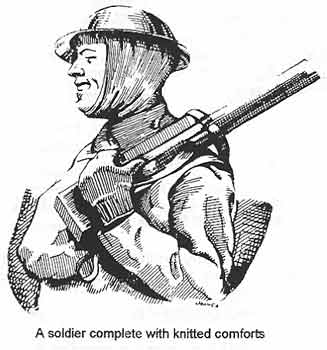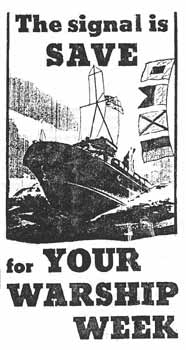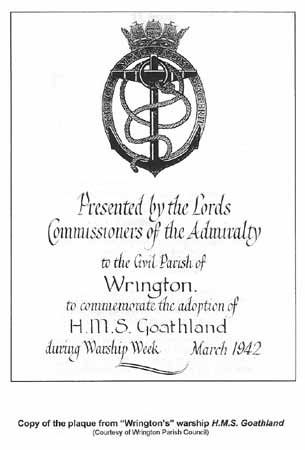 |
Wrington at War 1939-45 by Mark Bullen |
 |
Wrington at War 1939-45 by Mark Bullen |
 |
||||||||||||
| War Effort While the able-bodied left villages all over England to fight in the forces, those left behind wasted no time in doing their bit, in myriad ways, to help the cause. |
||||||||||||
|
“The knitting of comforts for men serving with the Forces has become a well-established rural industry. As in the case of other rural industries, it has been found that a distribution centre is necessary if the maximum use is to be made of the care and craftsmanship which have been exercised.” To this end, and to supply other comforts, the Fund was established in November 1939, the County Territorial Army Association providing office accommodation and storage rooms to minimize overheads. Progress was rapid: During the following winter, the fund was specially asked to help in the provision of books, musical instruments, records, indoor games, wireless sets, film projectors and in fact any comforts which would lend themselves to the encouragement of cultural pursuits among young soldiers. Then, as now, ordinary citizens were able to give blood to the donor service as a means of helping others. The Weston Mercury carried an interesting story about the village: |
||||||||||||
 |
 |
|||||||||||
| During the war the public were encouraged to save and recycle anything they could. Housewives donated spare saucepans and other metal objects and thousands of tons of iron were salvaged by the removal of railings from front gardens and parks | ||||||||||||
| throughout the land In an attempt to appeal to people's patriotism and satisfy their desperate need to feel they werecontributing something useful to the war effort, government hit upon the ingenious idea of communities saving to “sponsor” their own warplane, which would be named after their particular town or village. As hoped, the idea fired the public imagination quickly and special “Spitfire” Funds were started all over Britain. Wrington took up the challenge just one year after the start of the war, when Frank Garrett chaired a meeting in the Memorial Hall, called to consider the advisability of launching such a Fund in Wrington. Garrett hoped that Wrington would join with the other local parishes if the scheme were adopted. The Reverend Hook didn’t entirely agree with the idea, saying that he had spoken to a number of people who thought that some of the money collected should go to the RAF Benevolent Fund. He pointed out that Spitfires were being turned out at a tremendous rate to meet all demands and that however many Spitfire Funds were inaugurated, it would not accelerate production. However, the general view was that a fund would give a focus for everyone to contribute to and the meeting agreed to start one, with the usual committee formed to oversee collection. The concept of “adopting” a weapon was not confined to aeroplanes. In February the following year the local paper carried news of Warship Week, with a full week’s activities planned and a target of £15,000. Although this might seem a lot, in the event more than £32,000 was collected and the whole programme was a tremendous success, with a mock auction alone raising over £5,000. Wrington and Axbridge jointly adopted the Hunt Class III destroyer, H.M.S. Goathland, named after the North Yorkshire village of the same name (and where the T.V. series Heartbeat was filmed). May 15-22 1943 saw Wings for Victory Week, with a grand procession of all local defence services opening the proceedings, headed by an R.A.F. band. The Parish Council Clerk then read out a letter which accompanied the presentation to the parish of a replica badge of H.M.S. Goathland and the following month plaques were exchanged at Axbridge. Although she never suffered the terrible fate of so many ships at the hands of the dreaded U-Boats, H.M.S. Goathland had a rather sad end. She was damaged by a German mine in the English Channel on 24 July 1944 and was saved but never repaired. |
||||||||||||
 |
||||||||||||